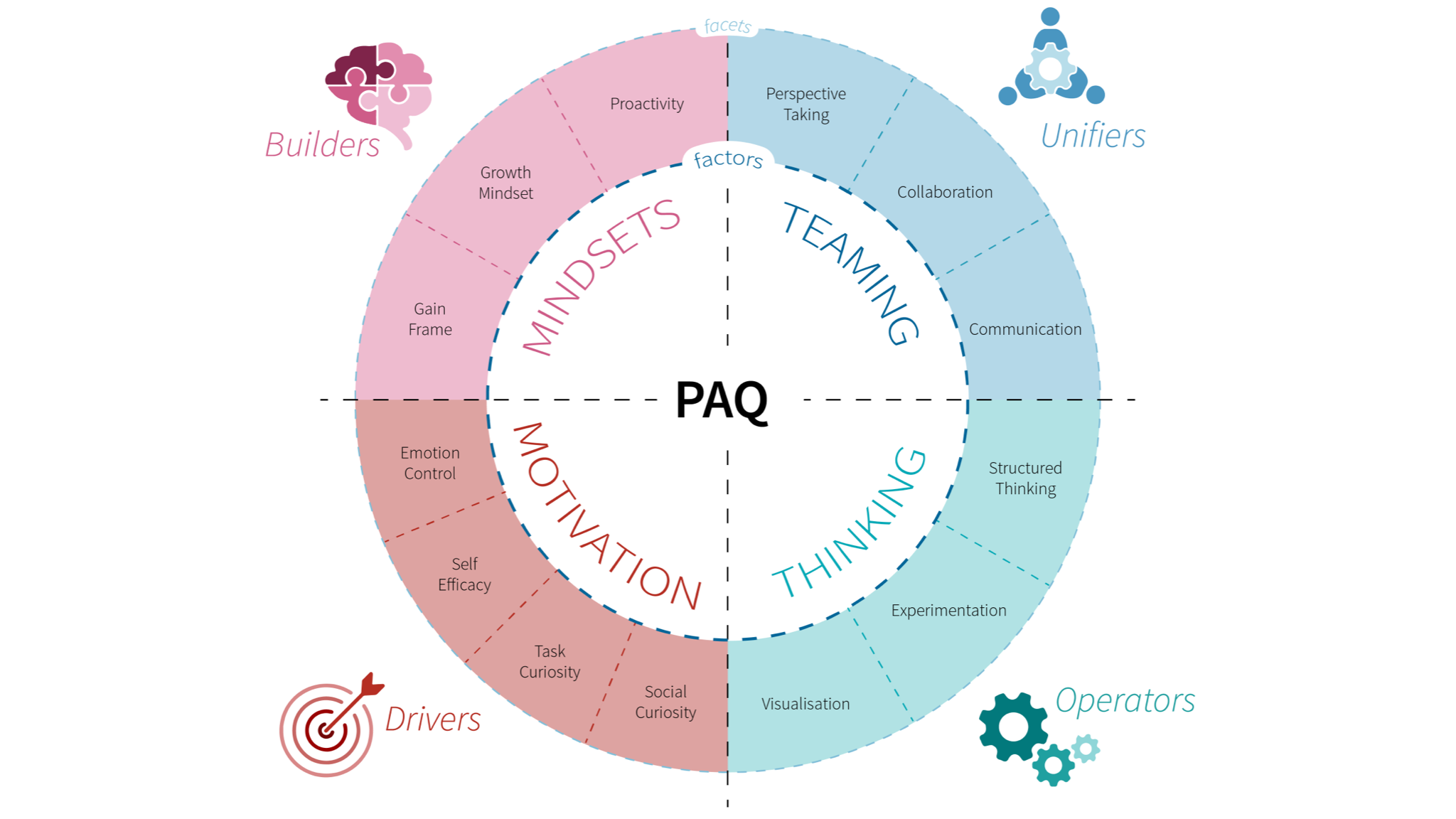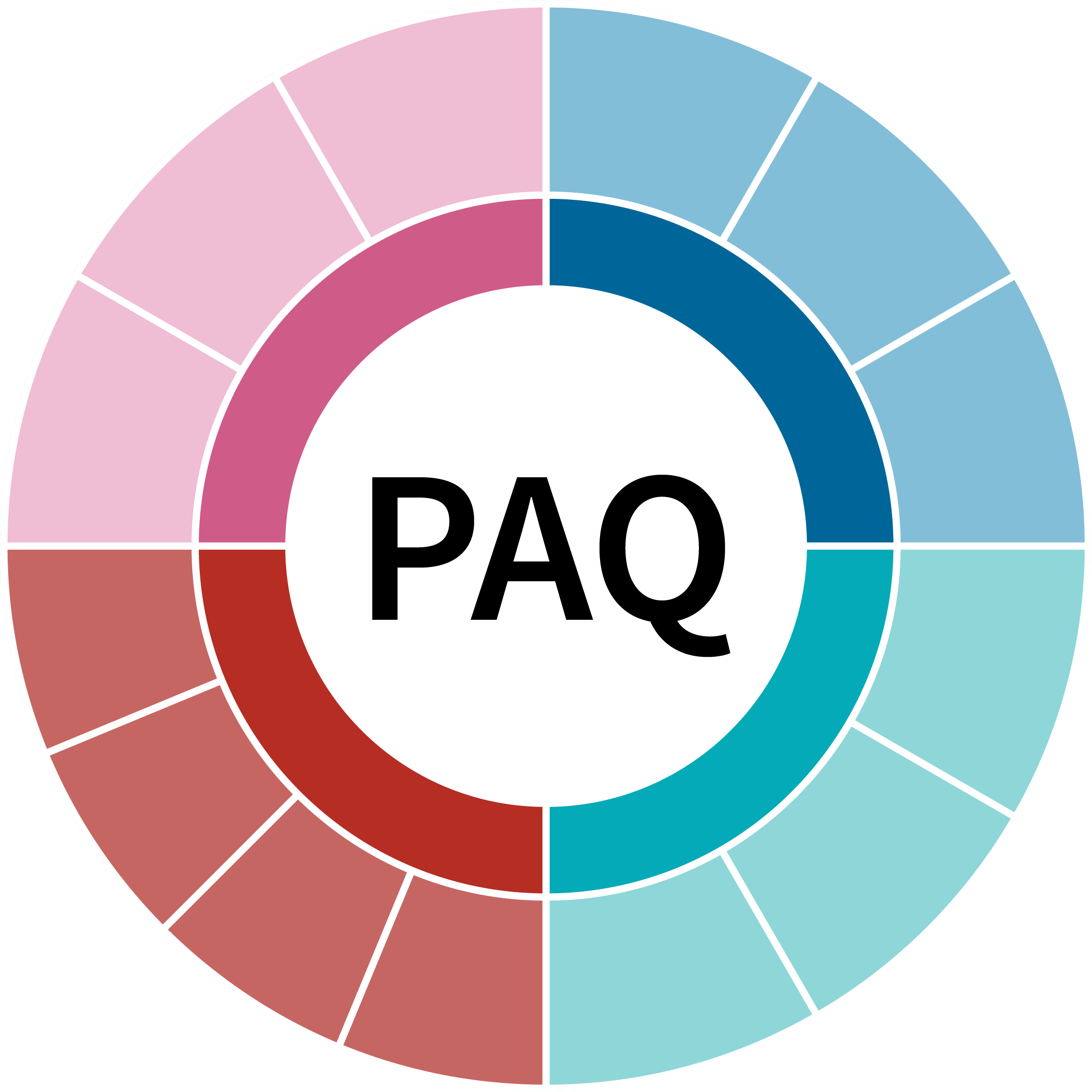What is the PAQ?
The Personal Adaptive Quotient (PAQ) is a cutting-edge metric that measures adaptability across key domains of Mindsets, Teaming, Motivation, and Thinking in professional settings. Offering personalized feedback and actionable strategies the PAQ is designed to enhance adaptability for professionals, team leaders, and HR managers, backed by psychological research for reliability and validity.

The 4 Factor Model
The PAQ model is broken down into Mindsets, Teaming, Motivation, and Thinking to provide a holistic view of adaptability, capturing the complex interplay between an individual's psychological attitudes, social collaboration skills, internal drive, and cognitive processes. This segmentation allows for targeted insights and strategies, enabling precise development of adaptability in professional settings, essential for thriving in today's dynamic work environments.
Mindsets
Mindsets are the intuitions, perceptions, mental models and assumptions that shape and bias judgements, often unconsciously. Mindets influence engagements with tasks, persistence and interpretation of feedback as motiviating or demotivating.
Gain Frame
The Gain Frame is a progress-focussed mindset. It seeks to build upon what has been achieved and learnt so far, including setbacks, to adapt new strategies. The Loss Frame focusses on shortfalls, errors and mistakes.
Growth Mindset
A Growth Mindset focuses upon changeable factors, such as effort and strategies, as explanation for performance. This is contrasted with a Fixed Mindset, which focuses upon innate ability or other factors beyond immediate control.
Proactivity
The Proactive Mindset seeks out problems and opportunities for improvement, through anticipation, panning and engagement. Proactive people engage resources, inclusing their own and others' capabilities, to find solutions
Teaming
Teaming is the process of working through adaptive challenges with others, and includes behavious that enable effective engagement amongst team members during problem solving. These behaviours include taking other perspectives, collaboration and clear communications.
Perspective Taking
Perspective Taking is standing in the other person's shoes, trying to understand their motives and how situations effect their decisions and behaviours.
Collaboration
Collaboration is the process of working with other people to achieve a goal or complete a task. Effective collaboration is based on shared purpose, trust, inclusion and shared effort.
Communication
Communication is the process of exchanging information and understanding between people. Understanding is enhanced by the clarity and structure of information being exchanged, and through effective listening to and engagement with responses.
Motivation
Motivation includes the drivers of engagements, focus and persistence on adaptive tasks, including self-beliefs, emotional regulation, and curiosity. Motivation leads to the channeling of effort into effective problem solving, continuous learning and continuous improvement.
Emotion Control
Emotional control is the capability to manage ones emotional reactions to task feedback and evaluate judgements. Emotional control enabbles individuals to sustain focus and continue striving on tasks.
Self-Efficacy
Self-Efficacy is the belief that effort and strategies will lead to recquired learning, problem-solving and desired outcomes on adaptive tasks. It includes the confidence to work through uncertainty and setbacks and to adapt strategies as needed.
Task Curiosity
Task curiosity is the motivation to discover something new and learn what is unknown about tasks. This leads to observations, asking questions, exploration around task challenges and striving for new task processes.
Social Curiosity
Social curiosity is the motivation to understand other people, including their personal motives and other reasons for their behaviours. It includes asking questions, observations, and other forms of exploration to learn about, rather than judge, people.
Thinking
Thinking is the set of capabilities used in the search for, processing and organisation of information. It includes the analytical methods, tools and mental models used to focus, search and collect data and the analysis of synthesis of information. The thinking processes may be conscious and/or subconscious.
Structured Thinking
Structured thinking is the process of applying thinking frameworks that focus attention and allow effective analysis of problems. It leads to clear organisation, analysis and synthesis of information into adaptive judgements.
Experimentation
Experimentation is a process of making and then testing guesses, predictions or hypotheses against the feedback or other evidence. Effective experimentation avoids confirmation biases by actively seeking information to test or disproves what they believe.
Visualisation
Visualisation is the presentation of data and information using images, diagrams, or animation to communicate clear messages, using trends, petterns, outliers, etc. in an engaging and accessible format.
How the PAQ Differs from Traditional Personality Assessments
Adaptability is not just crucial for success, it's also something you can enhance
Focus on Adaptability
Unlike static personality tests that measure fixed traits, PAQ emphasizes the dynamic nature of adaptability, assessing how individuals respond to change, challenges, and new learning opportunities in the workplace.
Actionable Insights for Growth
PAQ goes beyond merely identifying characteristics, offering concrete, actionable strategies for individuals to enhance their adaptability. This proactive approach supports continuous personal and professional development.
Scientifically Developed Framework
The PAQ is grounded in rigorous scientific research, specifically designed to measure adaptability in professional settings. This ensures that the assessment is both reliable and relevant to today’s fast-paced work environments.
Customized to Professional Contexts
The assessment specifically targets skills and behaviors critical for success in professional environments, making it uniquely relevant for career advancement, leadership development, and team dynamics improvement.
Comprehensive Analysis Through Four Factors
PAQ provides a detailed analysis by evaluating adaptability across four distinct factors, each with its own set of facets. This comprehensive approach offers a nuanced understanding of adaptability, surpassing the general insights provided by traditional assessments.
Evolutionary Approach to Professional Development
Unlike static assessments, PAQ advocates for an evolutionary approach to professional growth, emphasizing that adaptability is a skill that can be developed and refined over time.
Begin Your Journey with the PAQ
Reach out to us today to unlock your adaptability potential and take the first step towards transformative professional growth with the PAQ survey.
